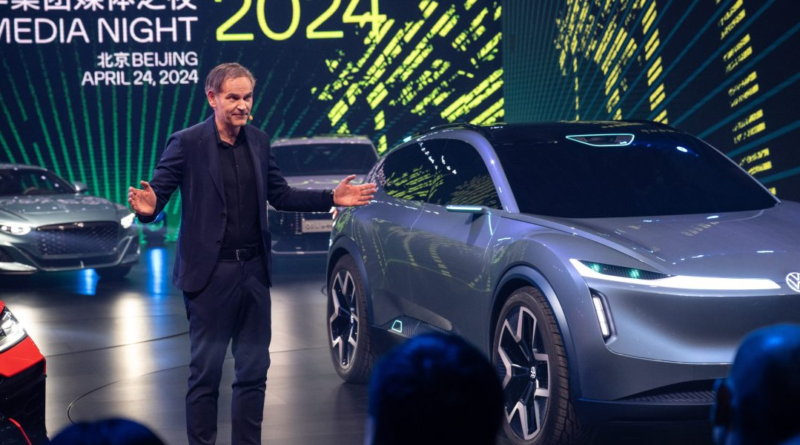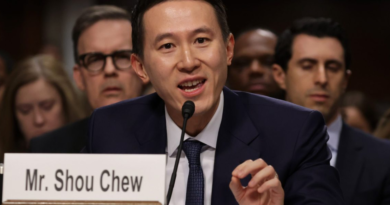Europe's big automakers shed $13bn in value as Tesla makes China breakthrough
Europe’s top automakers reluctantly moved into the spotlight Tuesday, forced to showcase their falling order books and double-digit earnings drops while putting on a brave face about their future profitability growth.
Indeed, earnings for a trio of carmakers worth a combined $208 million confirmed something analysts have known for some time: the automotive industry in the West is in the midst of a significant downturn.
This was reflected in double-digit declines in earnings at Volkswagen and Mercedes-Benz, as well as a 12% fall in revenues at Fiat-maker Stellantis.
However, the fall-off in results was still a surprise to investors, who voted with their feet.
The groups’ respective share price falls on Tuesday helped knock about $13 billion off their collective valuations.
Stellantis was the biggest casualty, dropping more than 8% in value in pre-market U.S. trading as the carmaker digested a surprising revenue dropoff, but both Volkswagen and Mercedes were left licking their wounds after markets in Europe opened.
The carmakers’ latest earnings come amidst the backdrop of a rising threat from overseas, coming off the back of a price war in several markets ignited by Tesla and Chinese manufacturer BYD.
Europe’s premier carmakers have for months been contending with the growing threat of Chinese manufacturers, whose bargain EVs are slowly creeping into the continent, leaving the likes of Volkswagen with little ability to compete in a price war.
While the outcome of a probe by the European Commission into anti-competitive practices may offer them a lifeline, the eye-watering profitability of Chinese EVs in Europe means only a steep tariff of 50% would be enough to affect their sales on the continent.
A common enemy
While the looming threat of China’s growing market share hangs over Europe’s carmakers, it was the EV transition that proved a common obstacle in the short run.
Sales of EVs have been slowing for several quarters, catching automakers off guard after major investment drives to shift production into future-proof vehicles. In Germany, new EV registrations declined 28% in the year to March, while in Norway, registrations halved.
There have been several obstacles hindering the transition to EVs. EV-skeptics have proved more difficult to convert than expected. Falling gas prices have reduced the economic incentives of converting to electric.
Meanwhile, disappointing resale values on EVs have also forced some drivers to hold back on converting, awaiting technological progress in the rapidly advancing field.
At the same time automakers have continued to ramp up production, creating a supply-demand mismatch that some fear could take years to correct itself.
Indeed Stellantis and Volkswagen have both promised a wave of new car models, both EV and ICE, will hit the market this year to rope in a broad church of drivers.
Mercedes, meanwhile, hailed increasing sales of its plug-in hybrid vehicles, helping offset a slowdown in pure electric sales.
“In addition to ongoing driver anxiety over battery range, affordability has long been a key issue and it’s more pressing in a world where interest rates remain stubbornly high. Expectations are being scaled back and the initial hype is dying down,” said Dan Coatesworth, investment analyst at AJ Bell.
“Car manufacturers have been slashing prices to stimulate demand but it’s still incredibly hard to shift the kind of volumes they would dearly love to see.”
Each of the automakers will be quick to assure investors that, like their customers’ buying habits, this is a transitionary phase. But if stutters continue, carmakers may need to start looking East.
Tesla turns it around
The problem for Volkswagen, Stellantis, and Mercedes is that another well-known, embattled carmaker is finding a way to turn lemons into lemonade.
As Kathleen Brooks, research director at XTB puts it, European carmakers’ misfortunes can be viewed in a better context alongside the cheerier news circling out of EV giant Tesla.
Despite reporting similarly disappointing results last year, Tesla shares are enjoying a staggering resurgence this week.
But while China is proving the thorn in European manufacturers’ sides, in Tesla’s case the country has proved to be rocket fuel for Elon Musk’s automaker in the last 24 hours.
Shares surged amid reports Tesla had closed a deal with Baidu that would help the group roll out its Full Self Driving technology in the country.
“The contrast could not be more stark between Volkswagon and Tesla,” Brooks wrote.
“While Tesla also reported weak sales and dramatically reduced profits compared to a year ago for Q1, its share price surged 15% on Monday after it announced a tie up with Chinese tech giant Baidu in order to provide its full self-driving technology, which could be a big revenue driver for the EV company.
“China is an important market for Tesla, and while sales slow in Europe and the US, as Volkswagon’s results show, the focus is now on growth in China.”




